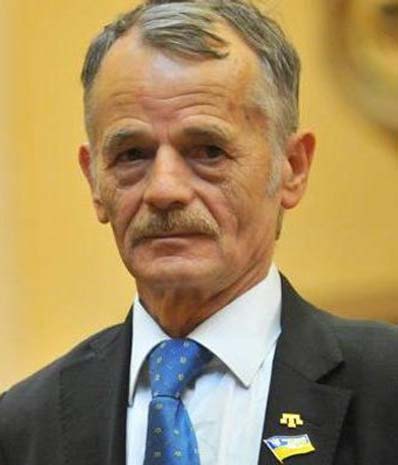Jemilev, Mustafa
Jemilev, Mustafa [Джемілев, Мустафа; Džemilev], b 13 November 1943 in Ai-Serez, Sudak raion, Crimea, RSFSR. Crimean Tatar human rights activist and political leader; head of the Mejlis of the Crimean people, Ukrainian parliamentarian. Deported from the Crimea as an infant with his parents in 1944 during the Stalinist regime’s mass deportation of the Crimean Tatars (Sürgünlik), Jemilev grew up in Uzbekistan. Since the 1960s he has taken an active part in the Crimean Tatar national movement, emerging over time as its leading figure. In 1962 he lost his job after he was implicated in the trial of the Union of Crimean Tatar Youth and in 1965 he was dismissed from an agricultural institute for his political activities. He was first arrested in 1966 and subsequently rearrested six more times, spending by 1986 a total of approximately 15 years in the Soviet penal system and GULAG labor camps. Jemilev and his contemporaries were dedicated to taking their struggle for Tatar rights, particularly that of return to their homeland, beyond the realm of polite petitioning of the Soviet authorities. In that respect the contacts he made in the latter 1960s with human rights activists in Moscow, particularly Petro Grigorenko, were instrumental in elevating the profile of the Tatar cause.
In 1987 Jemilev moved to the historic Crimean Tatar center of Bakhchysarai and involved himself with organizing the Tatars’ returning to their Crimean homeland. In June 1991 the Crimean Tatars chose him to head their representative parliamentary body, the Mejlis, at a Kurultai (congress) held in Simferopol. The appellation Qırımoğlu (‘son of the Crimea’) was also extended to him. Since then Jemilev has continued to press Kyiv for the extension of Ukrainian citizenship to the returnees, for recognition of Crimean Tatar national autonomy, and for material aid. His approach has been moderate, and he may properly be credited for the fact that the Tatar return—rife with potential for violence— took place in a relatively peaceful manner. As well, he has steered the Crimean Tatar national movement toward a pro-Ukrainian position.
In 1998 he was elected to the Supreme Council of Ukraine on the Popular Movement of Ukraine (Rukh) party list. He joined the Rukh caucus, which long championed the Crimean Tatar cause, and became a member of the human rights committee. In the elections of 2002, 2006, and 2007, he was re-elected having switched to Viktor Yushchenko’s Our Ukraine electoral alliance. Jemilev announced in November 2011 his intention to retire from politics, but the following year he was again re-elected, this time on Yuliia Tymoshenko’s Batkivshchyna party list. In the 2014 elections, he was no. 5 on the Petro Poroshenko Bloc (BPP), and in 2019 no. 6 on Poroshenko’s Eurosolidarity bloc, both times successfully.
After the Russian Federation annexed the Crimea in 2014, against which he protested publicly, the occupational authorities immediately barred Jemilev for five years from the peninsula. Later, he was charged and tried in absentia with unspecified ‘premeditated crimes’ in an endless trial conducted in Russian-controlled Crimea. In 2021, he was barred from entering for an additional thirteen years (to 2034), accused of attempting to enter the Crimea illegally as well as committing firearms offences. Following Russia’s full-scale invasion of Ukraine, he reported that Turkey had offered to evacuate the besieged Mariupol defenders by sea, but Moscow demanded their full surrender.
In November 2023, on Jemilev’s eightieth birthday, President Volodymyr Zelensky bestowed on Jemilev the order of Hero of Ukraine, the country’s highest award, for his defence of Ukraine and of Crimean Tatars’ rights. Previously recognized with the UNHCR’s Nansen Medal for refugee activism, Jemilev’s life has been devoted to upholding two basic principles: tolerance and non-violence.
Bohdan Harasymiw
[This article was written in 2024.]
.jpg)
